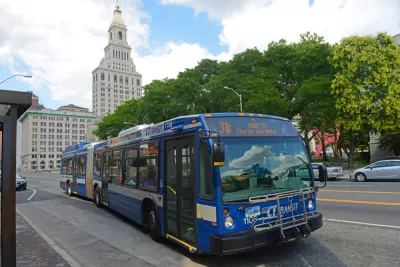Local leaders applaud the move, but are calling on the state to keep fares free permanently.

The Connecticut General Assembly voted to extend free bus fares in the state until the end of March 2023, but transit advocates and city leaders in cities like Hartford and New Haven hope the state will make fare-free transit permanent, reports Mark Zaretsky in Mass Transit.
Zaretsky quotes East Rock Alder Anna Festa, D-10, chairwoman of the Board of Alders' City Service and Environmental Policy Committee, who said, “Eliminating fares has increased ridership and improved efficiency. This benefits everyone by lessening the number of cars on the road and reducing emissions.” Wooster Square Alder Eli Sabin, D-7, pointed to the economic impact of free bus fare, which can save residents as much as $1,000 per year.
The extended fare-free program is coupled with the extension of a gas tax holiday until the end of December, after which the gas tax will gradually increase until May. “Free bus service costs the state about $2.7 million a month, while the gas tax holiday that the General Assembly also voted to extend through the end of the year costs the state about $20 million a month, with the figure reaching as high as $25 million in the summer, when people drive the most.”
FULL STORY: CT: Free bus fare extended through March 31, but New Haven, Hartford leaders want it permanent

Planetizen Federal Action Tracker
A weekly monitor of how Trump’s orders and actions are impacting planners and planning in America.

Maui's Vacation Rental Debate Turns Ugly
Verbal attacks, misinformation campaigns and fistfights plague a high-stakes debate to convert thousands of vacation rentals into long-term housing.

San Francisco Suspends Traffic Calming Amidst Record Deaths
Citing “a challenging fiscal landscape,” the city will cease the program on the heels of 42 traffic deaths, including 24 pedestrians.

Defunct Pittsburgh Power Plant to Become Residential Tower
A decommissioned steam heat plant will be redeveloped into almost 100 affordable housing units.

Trump Prompts Restructuring of Transportation Research Board in “Unprecedented Overreach”
The TRB has eliminated more than half of its committees including those focused on climate, equity, and cities.

Amtrak Rolls Out New Orleans to Alabama “Mardi Gras” Train
The new service will operate morning and evening departures between Mobile and New Orleans.
Urban Design for Planners 1: Software Tools
This six-course series explores essential urban design concepts using open source software and equips planners with the tools they need to participate fully in the urban design process.
Planning for Universal Design
Learn the tools for implementing Universal Design in planning regulations.
Heyer Gruel & Associates PA
JM Goldson LLC
Custer County Colorado
City of Camden Redevelopment Agency
City of Astoria
Transportation Research & Education Center (TREC) at Portland State University
Jefferson Parish Government
Camden Redevelopment Agency
City of Claremont





























